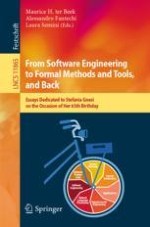2019 | OriginalPaper | Chapter
Product Line Verification via Modal Meta Model Checking
Authors : Tim Tegeler, Alnis Murtovi, Markus Frohme, Bernhard Steffen
Published in: From Software Engineering to Formal Methods and Tools, and Back
Publisher: Springer International Publishing
Activate our intelligent search to find suitable subject content or patents.
Select sections of text to find matching patents with Artificial Intelligence. powered by
Select sections of text to find additional relevant content using AI-assisted search. powered by
